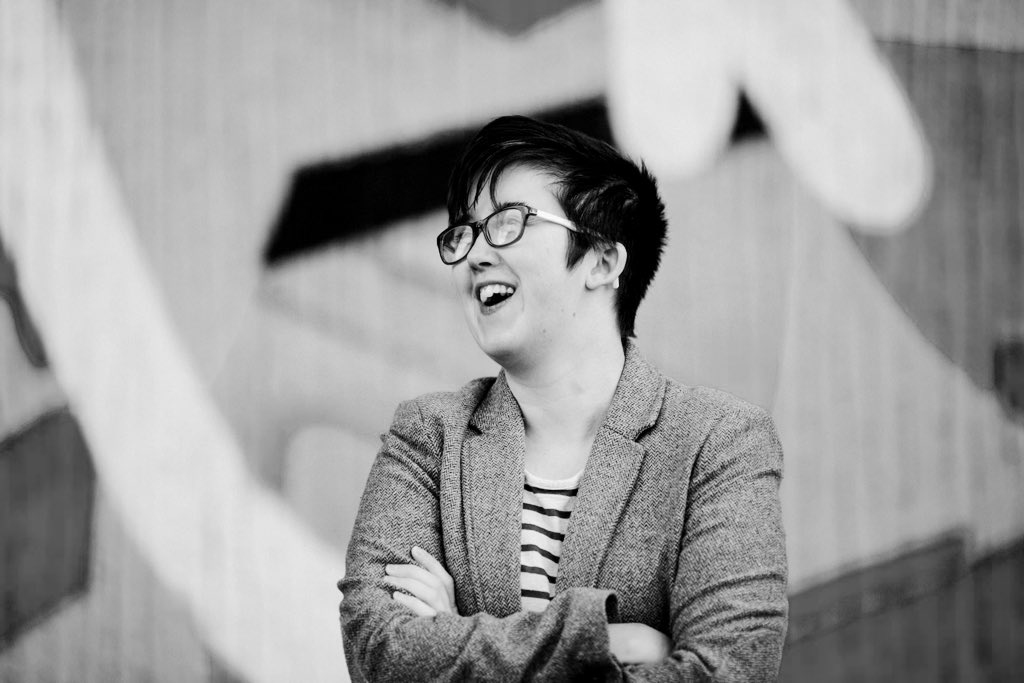
On the evening of the 18th April 2019 my friend, the journalist and author , was murdered by the New IRA as she observed a riot in Derry/ Londonderry. Ki**ed, by a bullet.
Lyra was due to have dinner at my house the next night – Good Friday – with her partner, Sara Canning, and some friends, including Anna Burns, the author, and editor Chloe Lambourne, who was staying with me at the time.
Around midnight I noticed four missed calls from Sara. Assuming it was a just a late change of plan for the dinner, I called her back.
‘Ali, I don’t have long; the police are here. I’m in the hospital. Lyra has been shot. She’s dead. Please can I give the media your number? I don’t know what to do.’
Lyra? Dead? Shot? Why?
As I struggled to deal with the world’s media, Lyra’s remains were brought home to her mummy’s house in north . Lyra lay beneath the window in the front room, watched over by her mum, Joan, in her wheelchair. Light fell through the net curtain onto Lyra’s face as her mum sat stroking her hair.
Outside, reporters and news crews waited. Further afield, vigils popped up all over Ireland and the UK. Lyra’s sister Nichola and her partner Sara meanwhile were making funeral arrangements that changed hourly. The President of Ireland was definitely coming; the Queen was sending someone. The Prime Minister would be there.
After the funeral, requests to make a documentary about Lyra flooded in from all over the world, forcing Nichola and Sara to put me on the spot: ‘Listen Ali, Lyra would only want you to make a film. We will help you. We cannot allow Lyra’s work and voice to be silenced by that bullet…we have to do something.’
They were right and with that motivation and their support, I agreed.
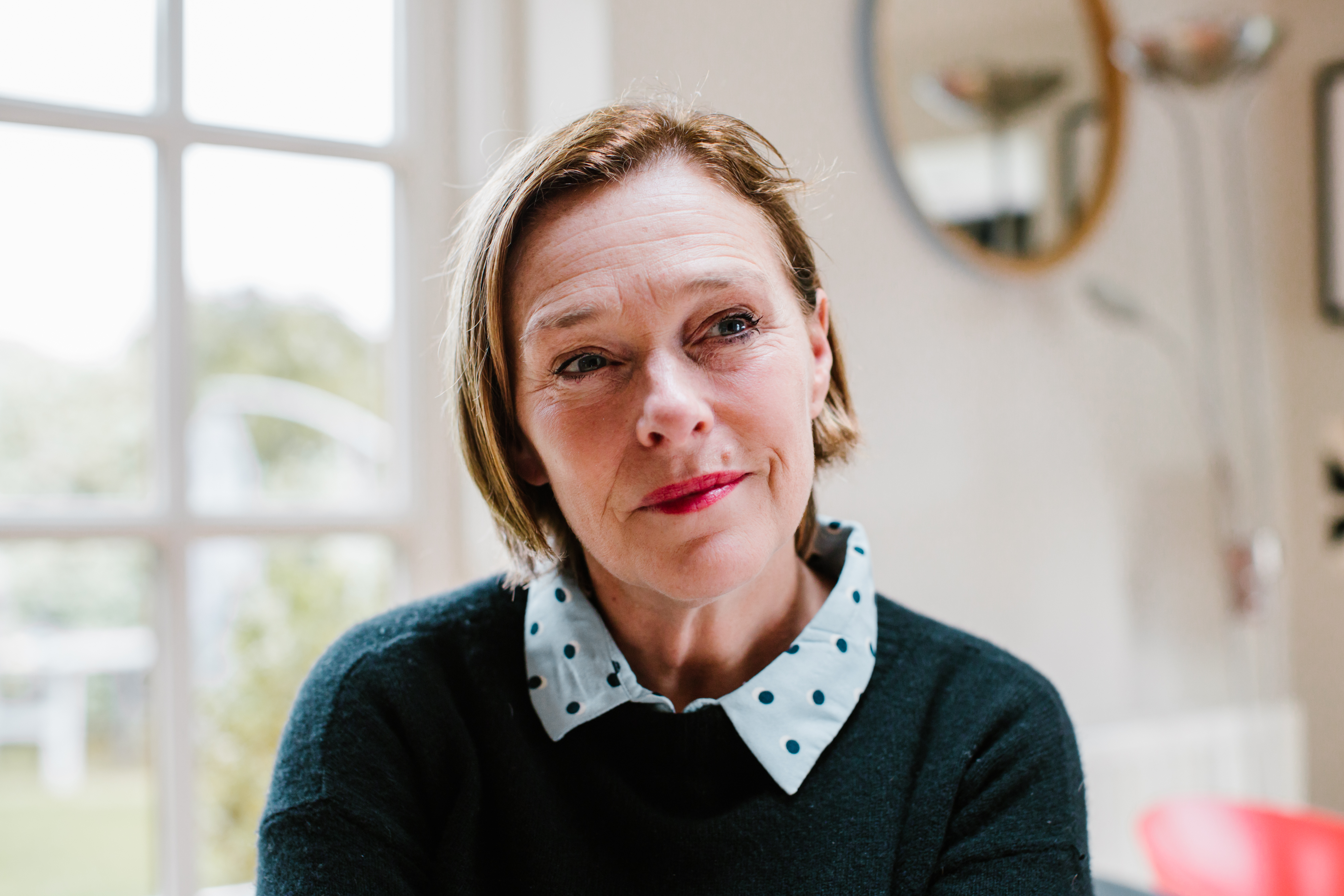
For the next year, I followed Nichola and Sara and filmed observationally as events unfolded – arrests, the discovery of the gun used in her murder, leads as to the gunman’s identity, more arrests. Slowly, the devastation at losing her baby daughter began to affect Joan. The last scene I filmed with her was days before she went into hospital and never came home. At that point and just as the country was on the edge of lockdown, , my commissioner, agreed that we should put the film on ice and take a break.
During this quiet time, Nichola, Lyra’s sister, found a suitcase full of VHS recordings of Lyra growing up which inspired us to reassess the film’s potential structure. What if we had enough of Lyra’s voice recordings, alongside the VHS footage? Could Lyra tell the world her story if we used her voice and her written word over stunning cinematography to drive home the points that she was making?
By early 2021, this new desire to create a longer film to release in festivals and in the cinema became fulfilled with Channel 4’s blessing – only it meant we’d have to fundraise a significant amount to make it happen. On top of the channel’s budget we needed to find more money to make it a feature length film. I started writing to everyone from famous actors to wealthy local businessmen for help. And they all responded positively because it was Lyra – her story really touched so many people.
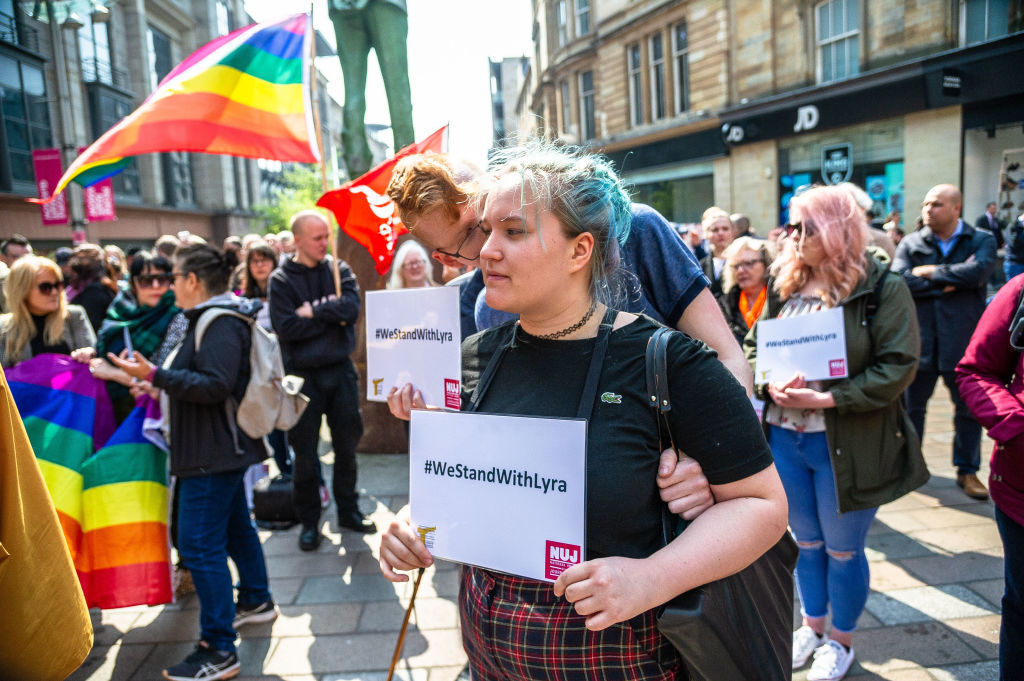
Multi-award winning musician and composer David Holmes, a local Belfast boy, offered to do the soundtrack as a gift for Lyra. Jackie Doyle, who was already involved with feature documentaries Young Plato and Nothing Compares, put a finance plan together and joined the team as producer.
There were many obstacles to deal with along the way, but listening to Lyra’s voice every day was the hardest. For months we’d carefully brought her back to life again, which was when the film began its new phase. Within the archive, we meet a fiery, curious young woman who loves asking questions. As Lyra tells us: ‘Most people hear their daughters go “mummy, mummy”, but all my mum ever heard was “why, why?”‘ As an aspiring journalist, we delved into the dangerous stories that Lyra was investigating about Northern Ireland’s troubled history, with stories centring around people whose voices were often left unheard.
Despite her age, Lyra always seemed to gravitate towards finding truth in the darkest aspects of the past, and how that past has shaped her generation of ‘ceasefire babies’, those born during or just after the signing of the Good Friday Agreement. At just 16, Lyra wrote an article that won her the coveted ‘Sky Young Journalist of the Year’ award about the alarming rates of suicide among young people in Northern Ireland. When looking at this period in her life, we only had a short news clip of Lyra accepting the award and the article itself.
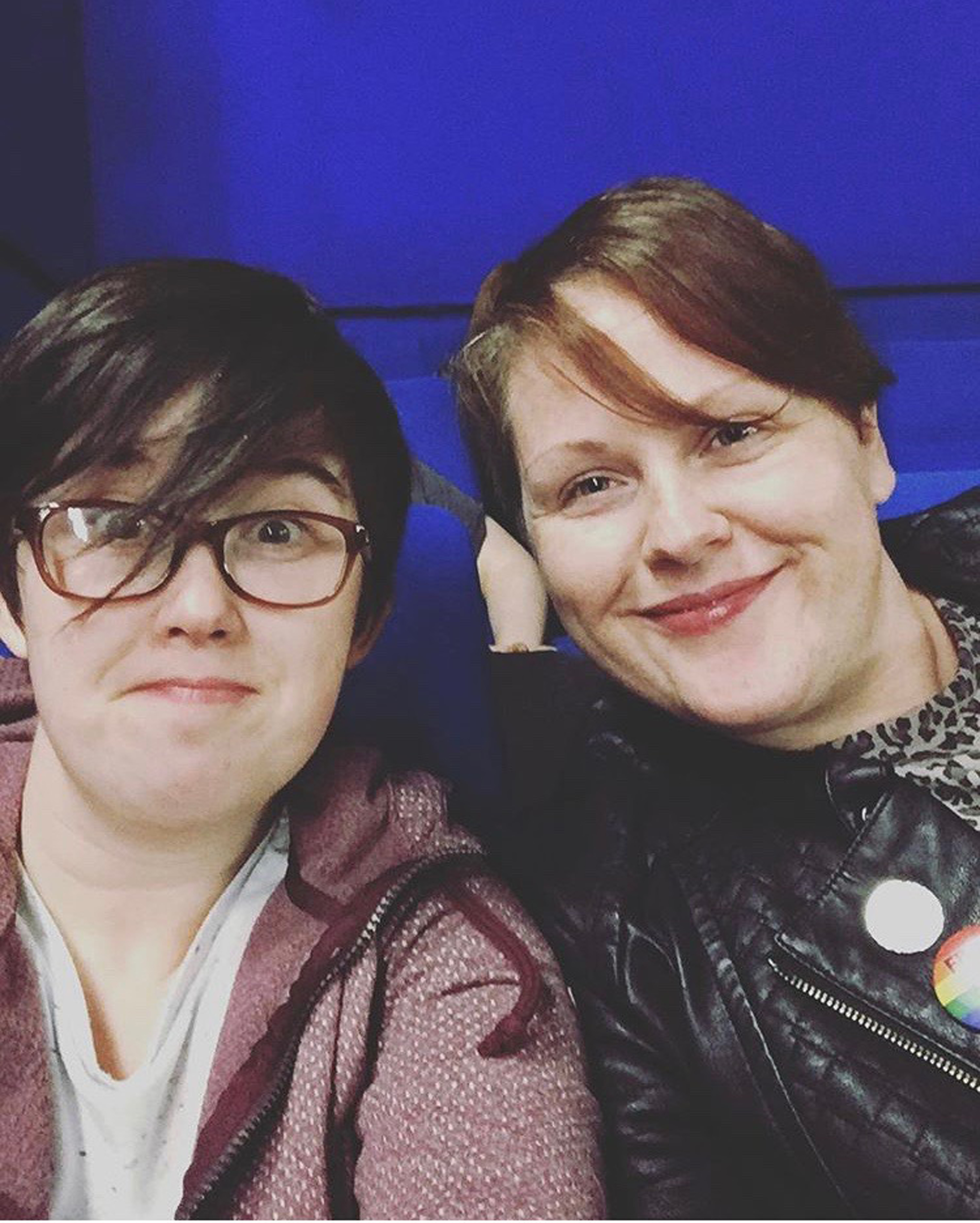
We got a call one morning from an old friend of Lyra’s, who said he remembers filming something with Lyra for a small project and the archive might be at his mother’s house deep in the County Down countryside, and he was right. As what happened numerous times throughout the filmmaking process, small but vital pieces of archive started appearing from such phone calls.
The footage was shot in 2008, when Lyra was aged 18, showing her strolling through botanical gardens and telling us her priorities as a journalist. ‘Like to be honest I really don’t care who Madonna has adopted next. The young mother who’s lost her son to suicide, how does she feel, you know? I want to know about real issues.’ As you find in the film, not only was her curiosity and her passion to tell the truth so infectious, but she was also onto something that not many journalists in Northern Ireland seemed to be covering.
Northern Ireland’s history has occupied a strange, if not cloudy space in the British public’s imagination. Lyra recognised that for the majority, the perception was that after the signing of the , the violence, the terror, and the trouble was all over; that everything would just go back to normal, society and its people would forget and move on with their lives.
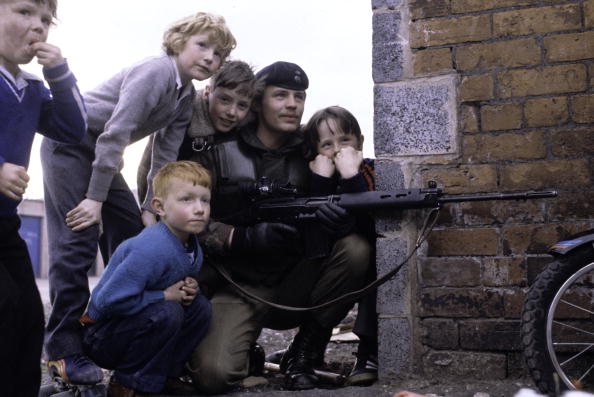
But that perception didn’t match what Lyra was seeing and hearing on the streets of Belfast. Like any war torn place, the scars and trauma of a conflict can follow you; and it is most strongly felt in the city’s predominantly working class areas, the communities often surrounded by graffitied murals of paramilitaries or eulogies to the innocent taken in warfare. It isn’t something easily shaken off.
Going through her articles, listening to old interviews on her dictaphones, and meeting the contributors of Lyra’s ourselves, we realised the film’s purpose was to understand post-conflict Northern Ireland through her eyes, the perspective of a ceasefire baby, one we rarely hear or see on film.
Lyra’s work took her from strength to strength. Still in her twenties, she was recognised as a rising star in her field by Forbes magazine in their prestigious ’30 under 30’ selection. She had found love when she met Sara and signed a two book deal with Faber and Faber – who described her work as ‘the voice of a generation’. She conducted a TED talk in Stormont, Northern Ireland’s parliament buildings, which was at that time (and still is now) empty as the local politicians continue to fail to power share together.
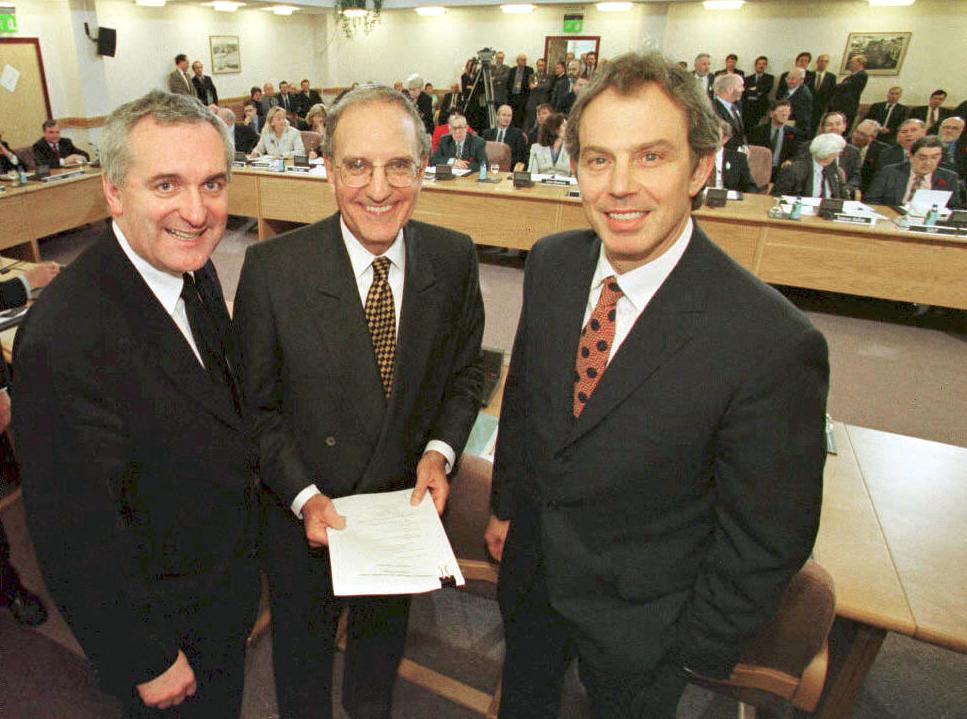
Just weeks before the night of her murder, she met with me in London to celebrate signing a ‘movie option’ on one of her stories. She told me of her plans to fly Sara to New York and propose to her in Central Park.
She had just moved to Derry to live with Sara but continued to travel up and down to Belfast to care for her beloved mother Joan. In Lyra’s words, ‘Everything was class’ … as in everything was going so well in her life.
The night of 18th April 2019, Lyra and Sara had been at their local slimming group. They always celebrated weight loss or gain with a McDonalds. They had gone home to chill when word broke of a riot in the Creggan estate. I should make it clear that when riots happen in Northern Ireland, people often go to observe. Since 1998 and the decommissioning of weapons, the idea that a gun would be on the streets that night and fired would not have been a thought that would have crossed any of the observers minds.
The riot had broken out after police raids in the Creggan earlier that day. Youths in hoods, directed and aided by older men, piled onto the streets armed with crates of petrol bombs and started attacking the police. Cars were hijacked and set on fire. Locals from the area, kids from a youth club, Lyra, Sara and other journalists watched, stood by a police armoured truck. Lyra tweeted: ‘Derry tonight – absolute madness’.
Sara recalls loud noises like fireworks or sparks from the burning cars and turning to Lyra to say they should move back but she wasn’t there. Lyra was on the ground. Then, Sara saw blood.
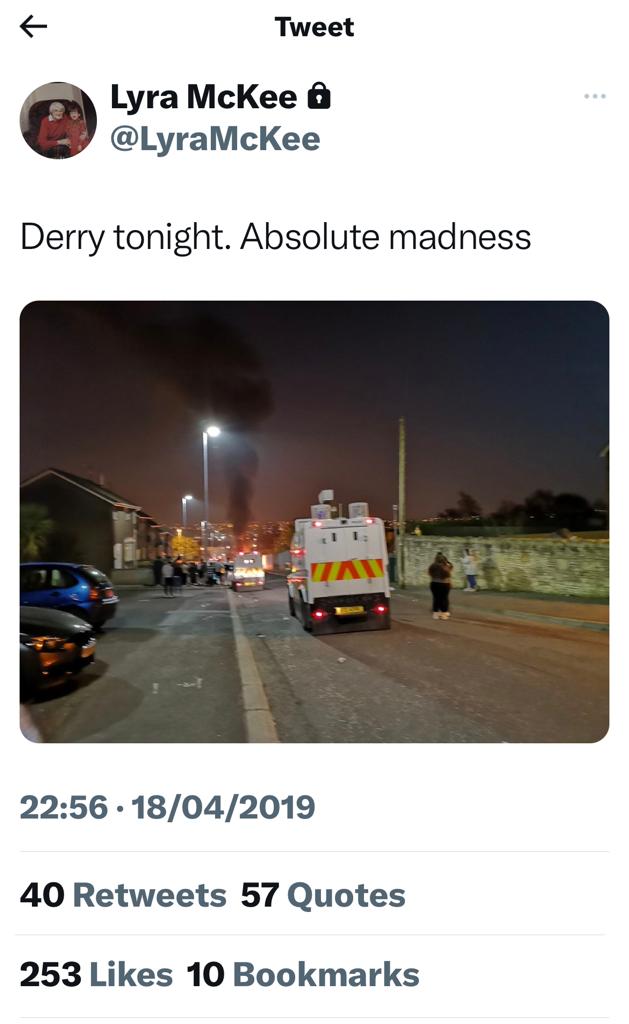
The police acted quickly and put Lyra into the back of their landrover, flew through the burning cars on an emergency route to hospital.
But it was all too late.
Lyra, at 29, was pronounced dead not long on her arrival.
Ki**ed by a bullet that had been fired at the police into the crowd of observers from a street corner.
Days later, the ‘New IRA’ – a Dissident Republican Group who do not accept the signing of the Good Friday Peace Agreement – claimed responsibility for her murder.
To date there have been three men charged with Lyra’s murder and are on bail awaiting trial.
The gunman has never been found.
Lyra McKee’s story in a desperately tragic way is also a timely reminder of just how fragile peace is in our country. Born into a single parent family in inner city Belfast, Lyra had in her short life touched the hearts of so many people. She showed us what hope and compassion is all about in her spoken and written word. She believed in ‘difficult conversations’ and often said that ‘brick walls aren’t there to keep you out, they are there to see how badly you want it.’
The local politicians should take stock of Lyra’s words. A ‘political vacuum’ enabled the new IRA to function. It’s time that bullet stopped travelling in our small traumatised country. There have been enough deaths. Lyra McKee’s – the 160th since the signing of the Good Friday Agreement – has to be the last.
‘Lyra’ airs Saturday 15th April 9.25pm Channel 4, then on All 4
Do you have a story you’d like to share? Get in touch by emailing [email protected]
Share your views in the comments below.

























